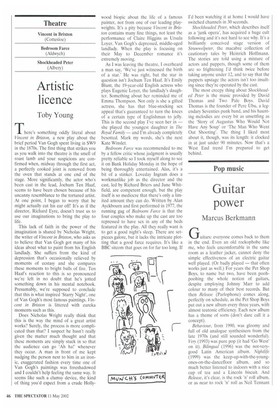Vincent in Brixton (Cottesloe) Bedroom Farce (Aldwych) Shockheaded Peter (Albery)
Artistic licence
Toby Young
There's something oddly literal about Vincent in Brixton, a new play about the brief period Van Gogh spent living in SW9 in the 1870s. The first thing that strikes you as you walk into the theatre is the smell of roast lamb and your suspicions are confirmed when, midway through the first act, a perfectly cooked joint is removed from the oven that stands at one end of the stage. More significantly, the actor who's been cast in the lead, Jochum Ten Haaf, seems to have been chosen because of his uncanny resemblance to the tortured artist. At one point, I began to worry that he might actually cut his ear off! It's as if the director, Richard Eyre, doesn't trust us to use our imaginations to bring the play to life.
This lack of faith in the power of the imagination is shared by Nicholas Wright, the writer of Vincent in Brixton, who asks us to believe that Van Gogh got many of his ideas about what to paint from his English landlady. She suffers from the kind of depression that's occasionally relieved by moments of ecstasy and she compares these moments to bright balls of fire. Ten Haafs reaction to this is so pronounced we're left in no doubt that he's jotted something down in his mental notebook. Presumably, we're supposed to conclude that this is what inspired 'Starry Night', one of Van Gogh's most famous paintings. Vincent in Brixton is littered with eureka moments such as this.
Does Nicholas Wright really think that this is the way the mind of a great artist works? Surely, the process is more complicated than that? I suspect he hasn't really given the matter much thought and that these moments are simply stuck in so that the audience can go `Ah ha!' whenever they occur. A man in front of me kept nudging the person next to him in an ironic, exaggerated fashion every time one of Van Gogh's paintings was foreshadowed and I couldn't help feeling the same way. It seems like such a clumsy device, the kind of thing you'd expect from a crude Holly
wood biopic about the life of a famous painter, not from one of our leading playwrights. It's a pity because Vincent in Brixton contains many fine things, not least the performance of Claire Higgins as Ursula Loyer, Van Gogh's depressed, middle-aged landlady. When the play is focusing on their May to December romance it's extremely moving.
As I was leaving the theatre, I overheard a man say, 'We've just witnessed the birth of a star.' He was right, but the star in question isn't Jochum Ten Haaf. It's Emily Blunt, the 19-year-old English actress who plays Eugenie Loyer, the landlady's daughter. Something about her reminded me of Emma Thompson. Not only is she a gifted actress, she has that blue-stocking sex appeal that's guaranteed to turn the knees of a certain type of Englishman to jelly. This is the second play I've seen her in — she played the youngest daughter in The Royal Family — and I'm already completely besotted. Mark my words, she's the next Kate Winslet.
Bedroom Farce was recommended to me by a fellow critic whose judgment is usually pretty reliable so I took myself along to see it on Bank Holiday Monday in the hope of being thoroughly entertained. Alas, it's a bit of a stinker. Loveday Ingram does a workmanlike job as the director and the cast, led by Richard Briers and June Whitfield, are competent enough, but the play itself is so mediocre that there's only a limited amount they can do. Written by Alan Ayckbourn and first performed in 1977, the running gag of Bedroom Farce is that the four couples who make up the cast are too repressed to have sex in any of the beds featured in the play. All they really want is to get a good night's sleep. There are setpieces galore, but it lacks the intricate plotting that a good farce requires. It's like a BBC sitcom that goes on for far too long. If I'd been watching it at home I would have switched channels in 30 seconds.
Shockheaded Peter, which describes itself as a 'junk opera', has acquired a huge cult following and it's not hard to see why. It's a brilliantly conceived stage version of Struwwelpeter, the macabre collection of cautionary tales by Heinrich Hoffmann. The stories are told using a mixture of actors and puppets, though some of them are so frightening I'd think twice before taking anyone under 12, and to say that the puppets upstage the actors isn't too insulting since they're operated by the cast.
The most creepy thing about Shockheaded Peter is the music provided by David Thomas and Two Pale Boys. David Thomas is the founder of Pere Ubu, a legendary Seventies punk band, and his haunting melodies are every bit as unsettling as the 'Story of Augustus Who Would Not Have Any Soup' or The Man Who Went Out Shooting'. The thing I liked most about it, though, was its length: it clocked in at just under 90 minutes. Now that's a West End trend I'm prepared to get behind.






































































 Previous page
Previous page